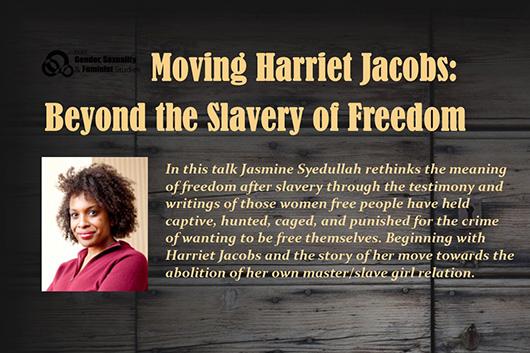Moving Harriet Jacobs: Beyond the Slavery of Freedom

An introduction to my larger book project, this talk rethinks the meaning of freedom after slavery through the testimony and writings of those women free people have held captive, hunted, caged, and punished for the crime of wanting to be free themselves. Beginning with Harriet Jacobs and the story of her move towards the abolition of her own master/slave girl relation, I am interested in struggles for freedom that do not end with the liberation of self-determination, but require, as Angela Davis reminds us, constant struggle. Rather than a canonization of her writing, my talk attends to the ways abolitionist Harriet Jacobs, best known for her 1861 slave narrative, a figure for whom freedom remains fugitive even after slavery, continues to move contemporary understandings of freedom beyond the sentimentality of a hero's journey and into conversation about the transformative power of collective action.
Jasmine Syedullah is a Visiting Assistant Professor of Race and Ethnicity in the Department of Sociology at Vassar College. She holds a Phd. in Politics with a designated emphasis in Feminist Studies and History of Consciousness from University of California Santa Cruz. Her current manuscript-in-progress If Home Were a Loophole: Fugitives of domestic violence and the unfinished work of abolition is a black feminist political theory of abolition.






